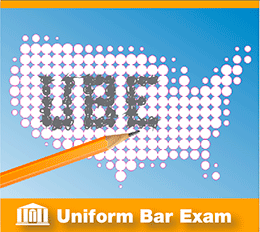New York State will begin using the Uniform Bar Examination in 2016, making it the fifteenth, and by far largest, state to do so.
The state’s chief judge, Jonathan Lippman, said he expected the move to result in a “domino effect” with other states jumping on the UBE bandwagaon. More than 15,000 people took the New York bar exam last summer.
At least one critic of the current system has called for his state to adopte the UBE. Erwin Chemerinsky, dean at University of California Irvine, wrote in an op-ed in the Los Angeles Times that he hoped California would be the next state to fall.
“The current system, under which each state sets its own requirements and won’t recognize out-of-state credentials, is inefficient, burdensome and, frankly, unjustifiable,” he wrote ” … the truth is that basic principles of law do not vary from state to state. And lawyers can learn the quirky specifics as they go. Forcing students to memorize detailed, state-specific rules, most of which they will never need to know and which they will promptly forget, does not ensure competence.”
Missouri was the first state to adopt the UBE in 2011. Five states added it in 2013, two in 2014, and one in 2015. Most of states are in the west, including Alaska, Arizona, Colorado, Idaho, Montana, Nebraska, North Dakota, Utah, Washington and Wyoming. Other states are Alabama, Kansas, New Hampshire and Minnesota.
The exam has 200 multiple choice questions, two tasks on basic lawyering and six essay questions that test on laws of general application.
The UBE will replace New York specific essay questions, which have been held on the first day of the exam. In lieu of state questions, students will take an online course on New York State law, and will need to pass a short multiple-choice exam.
Lippman said the New York Court of Appeals, which approved the change, did so because it will allow for better employment opportunities for graduates.
Depending on scores, students will be able to practice in the 14 other jurisdictions that use the UBE.
Lippman also said the change will make it easier for law offices to handle cases across state and international borders.
Nick Allard, dean at Brooklyn Law School, said the change is a step in the right direction.
“The existing entrenched bar exam and licensing system is unpredictable, unfair, and unaffordable for too many graduates and takes too long from graduation day to the day you are sworn in to become a licensed lawyer,” Allard told the Brooklyn Daily Eagle. ” “[W]e can expect New York now to take back control and exercise more oversight over the national testing organization, the NCBE, that designs and scores the test.”
Allard has been critical of the NCBE in recent months, stating that the “unregulated organization has lacked accountability and transparency,”
Allard was upset that the NCBE blamed examinees for a drop is passage rates this year.
Jim Rigos, owner of Rigos Professional Education Programs, said he expects a majority of the states to adopt the UBE.
“It’s going to get to a point where the law schools and the students [in jurisdictions not using the exam] are at such a disadvantage, that there’s going to be a lot of pressure from the academic side of things and some of the firms to get on board,” he said in 2013.
The National Conference of Bar Examiners created the exam to allow lawyers to smoothly transfer their scores to other jurisdictions, instead of waiting months to retake another state’s bar exam.
“Students are the big beneficiaries of this,” said Erica Moeser, president of the NCBE, which created the exam. “If there’s one group that should care about the UBE, it’s the person who is currently enrolled in law school and is looking to take the bar exam, finding a job, and dealing with debt, especially in this economy.”
Moeser said often times when law grads graduate in May, they don’t have employment lined up, and by the time that bar exam rolls around in July, that applicant may have secured employment, but not in the state in which they are testing. Without the option of the UBE, they would have to wait until the following February to take another exam.
“The UBE is intended to help new lawyers achieve mobility, without having to take a second bar exam when they don’t find a job in the jurisdiction in which they have already registered to take the bar,” Moeser said.

